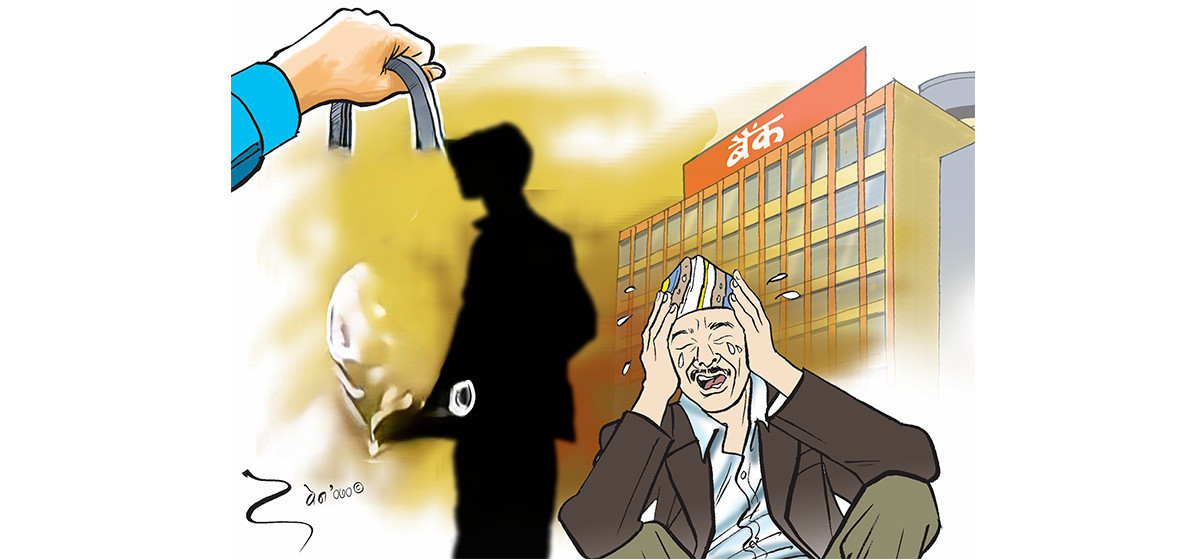
OR
#Editorial
Utilize excess liquidity to revive the economy
Published On: October 18, 2023 07:30 AM NPT By: Republica | @RepublicaNepal

Our financial landscape has lately witnessed a notable shift—banks are now experiencing an influx of liquidity. This surplus liquidity in the market has led to a reduction in deposit interest rates across various banks. This adjustment reflects the changing dynamics of the financial sector. While lowering interest rates is a step in the right direction, it is not the sole solution. The current abundance of liquidity offers a distinctive opportunity for financial institutions to play a pivotal role in reinvigorating the economy that is on the verge of a recession.
Traditionally, banks have primarily focused on providing loans against collateral such as land and houses. While this strategy serves its purpose, it is high time for financial institutions to adopt a more forward-thinking approach. This involves diversifying their lending portfolios, engaging in project financing, and conducting a thorough evaluation of project viability. By taking calculated risks and broadening their lending horizons, banks can significantly contribute to job creation and infuse much-needed momentum into the country's ailing economy. One promising avenue for deploying this excess liquidity is towards small and medium-sized enterprises (SMEs). These enterprises form the backbone of our economy, and supporting them during these challenging times is crucial. Governments can proactively facilitate credit extension to SMEs by guaranteeing 100 percent of the loans provided to them and streamlining the application process.
Moreover, central banks should confirm their readiness to accept these guaranteed loans as collateral, instilling confidence in lending institutions. To expedite the disbursement of funds to businesses, it is imperative for banks to streamline loan origination and servicing processes. This will ensure that the funds swiftly reach the hands of companies, enabling them to meet current expenses and fulfill their financial obligations, thereby fostering an environment conducive to growth. Nepal Rastra Bank, as the regulatory body overseeing all banks, can incentivize them by increasing the interest paid on reserves, provided they extend the maturity of obligations due before the year-end. This measure would catalyze a positive shift in the lending landscape, encouraging banks to actively participate in the economic revival.
It is evident that the current scenario demands a strategic realignment of the banking sector's focus. As a newspaper, we believe that the excess liquidity presents a unique opportunity that, if utilized effectively, can steer the nation towards economic revival. Banks need to take calculated risks, diversify their lending practices, and prioritize SMEs to inject momentum into the economy. The role of central banks and regulatory bodies is equally critical in providing the necessary impetus to drive this transformation. It is time for banks to step up and be proactive agents of change, significantly contributing to the economic resurgence that our nation so desperately needs.
You May Like This

Nepal’s financial sector is now on track: NRB Governor Adhikari
KATHMANDU, Dec 12: The Nepal Rastra Bank’s (NRB) Governor Maha Prasad Adhikari on Monday said that the liquidity problem in the... Read More...

NCBL sets up liquidity management fund of Rs 2 billion to help cooperatives facing liquidity shortage
KATHMANDU, Dec 27: National Cooperative Bank Limited (NCBL) has set up a liquidity management fund worth Rs 2 billion, citing to... Read More...

Tikapur Park sees huge influx of visitors
TIKAPUR, Nov 1: Tikapur Park in Tikapur of Kailali is becoming a destination among domestic tourists. The number of visitors to... Read More...





Just In
- Notorious criminals who had fled to India arrested in Nepal
- Meetings of three parliamentary committees today
- Health Minister Yadav address 57th session of Commission on Population and Development
- Actor CP Lohani no more
- Storm predicted in Lumbini, Madhesh, Sudurpaschim and Koshi provinces
- NHRC demands govt take effective measures to reduce fire incidents
- Nepal Investment Summit 2024: Investments worth Rs 9.13 billion approved
- SC directs SidhaKura news portal to appear with evidences on May 2













Leave A Comment